1. PREVENTIVE DETENTIONS
Preventive detentions in 2021 saw a rise by over 23.7% compared with the year before, with over 1.1 lakh people being placed under preventive detention, according to statistics released by the National Crime Records Bureau (NCRB).
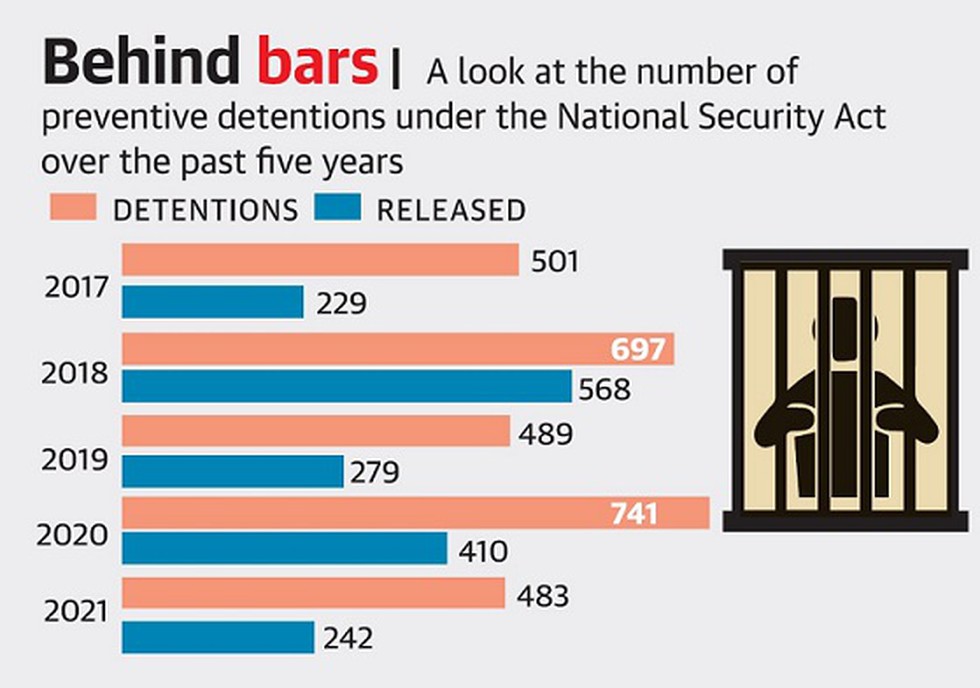
About:
- Of these, 483 were detentions under the National Security Act, of which almost half (241) were either in custody or still detained as of 2021-end.
- Over 24,500 people placed under preventive detention were either in custody or still detained as of 2021-end — the highest since 2017 when the NCRB started recording this data.
- The number of persons placed under detention has been increasing since 2017 — to over 98,700 in 2018 and over 1.06 lakh in 2019 — before dipping to 89,405 in 2020.
- According to Section 151 of the Code of Criminal Procedure, the police are empowered to make preventive arrests if they believe they must do so to prevent the commission of “any cognisable offence”. This detention can be extended beyond 24 hours if required “under any other provisions of this Code or of any other law”.
Source: The Hindu
2. SEAT BELTS
While details of the tragic circumstances in which former Tata Sons chairman Cyrus Mistry lost his life are yet to be officially stated, it appears passengers in the back seat of the Mercedes were not wearing seatbelts.
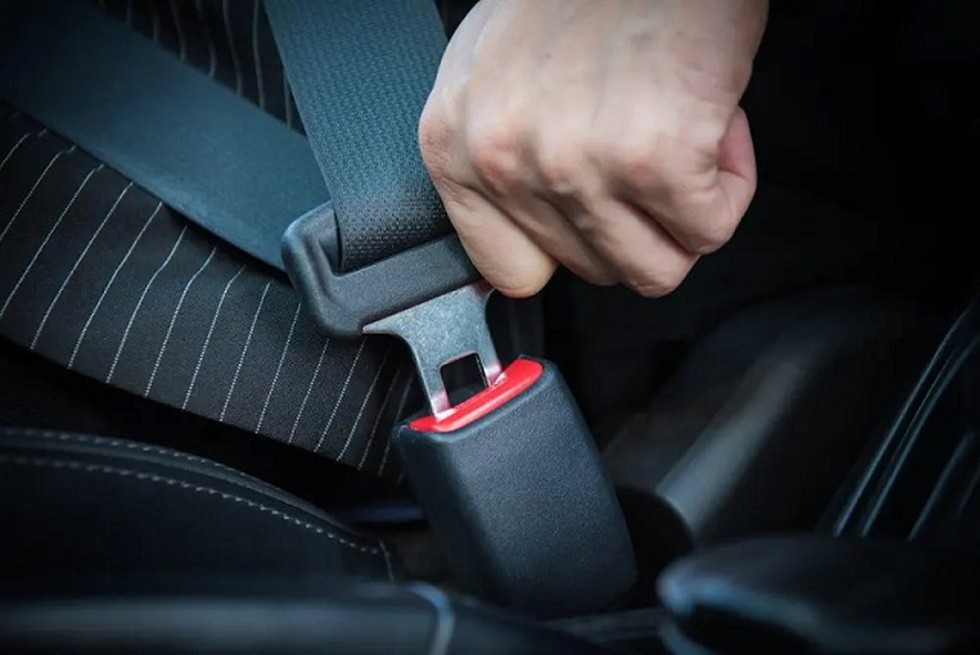
About:
- Seat belts came into existence in the late 1800s. Invented by George Cayley, an English aviation innovator, the original purpose behind their creation was to ensure that pilots were kept inside their gliders.
- It was not until February 10, 1885 that the first patented seat belt came into existence.
- Created by Edward J Claghorn, it was meant to keep tourists safe in New York City taxis. Ever since, seat belts have gradually made their way into our daily lives and have rightfully become our first line of defence while on the move on roads across the world.
The 3-point seat belt
- The seat belt as we know it now came into existence in 1959 after Swedish engineer Nils Bohlin invented the V-type three-point seat belt at the behest of Volvo.
- Up until then, seat belts were two-point lap belts — as we now see in aeroplanes.
Required by the law
- Rule 138(3) of the Central Motor Vehicles Rules, 1989, makes it mandatory for the rear passengers too to wear seat-belts.
- Further, non-wearing of seat-belts by the driver or passengers has been made punishable with a fine of one thousand rupees according to Section 194B(1) of the Motor Vehicles Act, 1988 (as amended by the Motor Vehicles (Amendment) Act, 2019.
Source: Indian Express
3. MOHENJODARO
The recent spell of heavy rains and floods that ravaged large parts of Pakistan’s Sindh province has also taken a heavy toll on the archaeological site of Mohenjodaro.
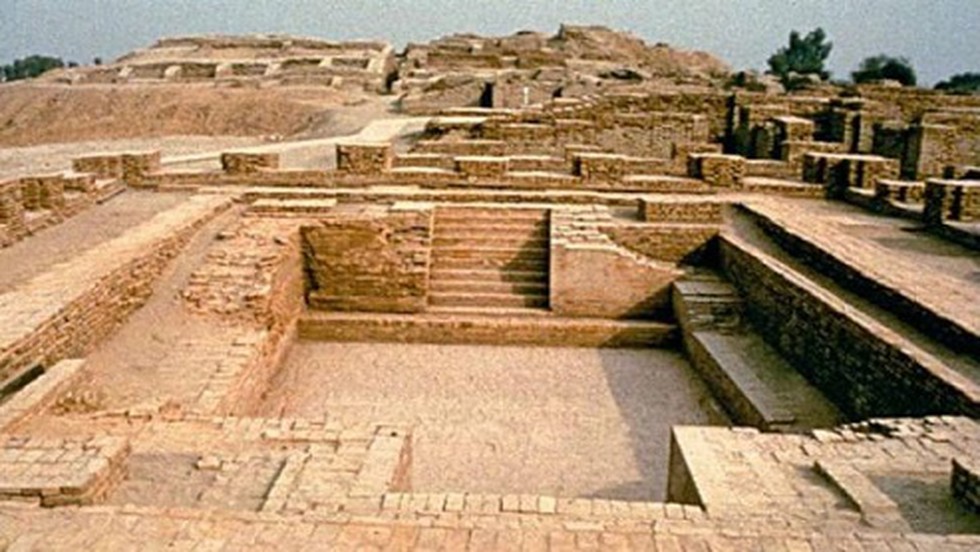
About:
- In fact, the calamity has pushed the archeological site – situated on the bank of the Indus river – to the “brink of extinction”.
- Mohenjo-daro, a group of mounds and ruins, is a 5000-year-old archaeological site located about 80-km off the city of Sukkur. It comprises the remnants of one of two main centres of the ancient Indus Valley Civilisation, the other one being Harappa.
- Mohenjo-daro, which means ‘mound of the dead’, was one of the oldest cities of the world.
- Known to be a model planned city of the ancient civilisation, the houses here had bathrooms, toilets and drainage system. Though in ruins, the walls and brick pavements in the streets are still in a preserved condition.
- The ruins of the city remained undocumented for around 3,700 years, until 1920, when archaeologist RD Banerji visited the site. Its excavation started in 1921 and continued in phases till 1964-65. The site went to Pakistan during Partition.
Other Indus Valley sites
- The Indus Valley Civilisation spanned much of what is now Pakistan and the northern states of India (Gujarat, Haryana and Rajasthan), even extending towards the Iranian border.
- Its major urban centres included Harappa and Mohenjo-daro in Pakistan, and Lothal, Kalibangan, Dholavira and Rakhigarhi in India.
Source: Indian Express
4. PUPIL-TEACHER RATIO
The country has witnessed substantial reduction in pupil-teacher ratio over the last one decade.
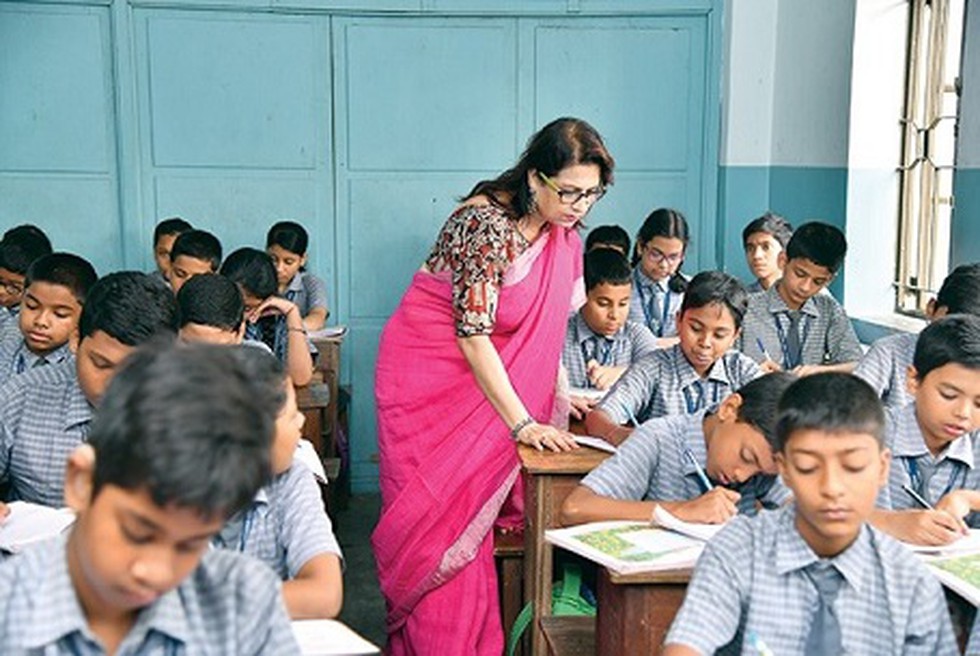
About:
- According to Ministry of Education, in Primary Schools, the pupil teacher ratio which was at 43 in 2010-11 has come down to 26.3 in 2020- 21.
- While in Upper Primary schools, the pupil-teacher ratio has reduced from 33 in 2010-11 to 18.9 in 2020-21.
- The Pupil Teacher Ratio at different levels of education show availability of adequate number of teachers for teaching children enrolled at different grade.
- The increase in number of teachers in schools is contributing to focused delivery of education.
Source: All India Radio
5. CREATIVE MINDS OF TOMORROW
The information and Broadcasting Ministry has invited entries for 75 Creative Minds of Tomorrow.
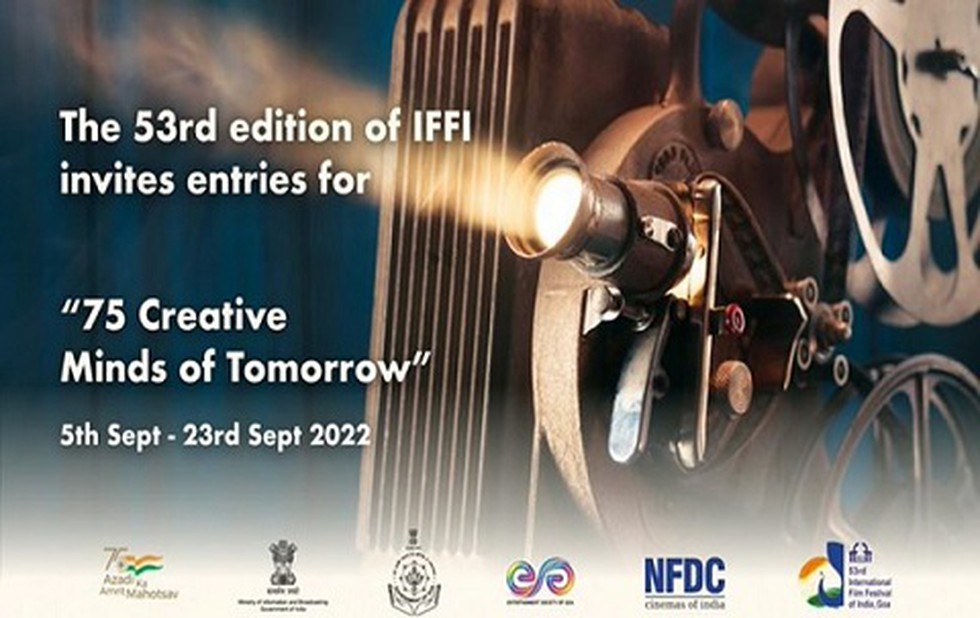
About:
- The segment is an annual platform at the International Film Festival of India to identify, encourage and nurture young creative talents from across various aspects of filmmaking. The entries will be open till 23rd of this month.
- The initiative was launched last year, as part of the Azadi Ka Amrit Mahotsav.
- It was conceptualised by Information and Broadcasting Minister Anurag Thakur to provide a platform and connect young talent with the masters of industry from the media and entertainment sector.
- The initiative is also an another step in the direction of making India a content and post-production hub for the world, by identifying, nurturing and up-skilling young talent.
- The 75 creative minds will be shortlisted and selected on the basis of their submissions by an eminent jury, under the aegis of the National Film Development Corporation.
- This program identifies young budding film makers and provides them a platform to interact and learn from national as well as international film makers during the period of IFFI, Goa.
Source: All India Radio
6. CONVERSION THERAPIES
The National Medical Commission (NMC), the apex regulatory body of medical professionals in India, has written to all State Medical Councils, banning conversion therapy and calling it a “professional misconduct”.

About:
- The NMC was following a Madras High Court directive to issue an official notification listing conversion therapy as a wrong, under the Indian Medical Council (Professional Conduct, Etiquettes and Ethics) Regulations, 2002.
- Conversion or reparative therapy is an intervention aimed at changing the sexual orientation or gender identity of an individual with the use of either psychiatric treatment, drugs, exorcism and even violence, with the aim being to make the individual a heterosexual.
- The conversion therapy umbrella also includes efforts to change the core identity of youth whose gender identity is incongruent with their sex anatomy.
- Often, the therapy is offered by quacks with little expertise in dealing with the issue.
Source: The Hindu
7. UGC RESEARCH SCHEMES
The University Grant Commission (UGC) launched new research fellowship and research grants schemes on the occasion of Teachers Day.

About:
- They are Savitribai Jyotirao Phule Fellowship for Single Girl Child, Dr Radhakrishnan UGC Post-Doctoral Fellowship, Superannuated Faculty Members Fellowship, Research Grant for In-Service Faculty Members and Dr D S Kothari Research Grant for Newly Recruited Faculty Members.
- UGC has been giving research grants from time to time in different kinds of fellowship to enable the research ecosystem in the Universities across the country.
University Grants Commission (UGC)
- UGC is a statutory body set up by the Department of Higher Education, Ministry of Education in accordance to the UGC Act 1956 and is charged with maintenance of standards of higher education in India.
- It provides recognition to universities in India, and disbursements of funds to such recognized universities and colleges.
- The headquarters are in New Delhi.
Source: All India Radio
8. INDIA-NEPAL DEFENCE RELATIONS
Indian Army Chief General Manoj Pande was conferred with the honorary rank of General of Nepal Army by President of Nepal Bidhya Devi Bhandari in a ceremony at her residence Sheetal Niwas.
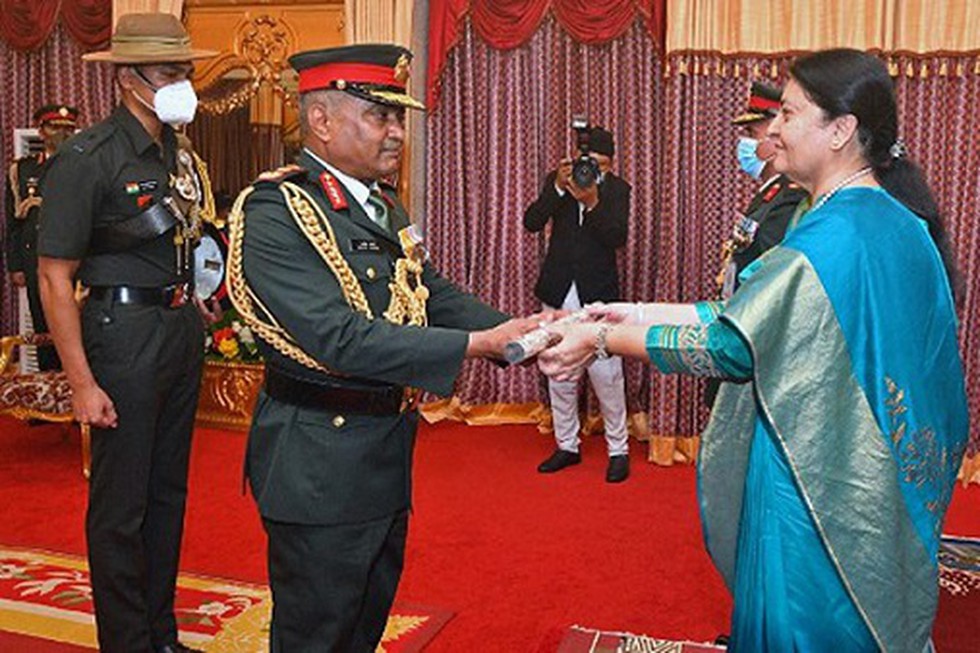
About:
- The ceremony was part of the unique tradition between the two Armies. General Pande is on a four-day official visit to Nepal from 5th to 8th of this month. This is his first visit to Nepal as Chief of Army Staff.
- General Manoj Pande also handed over non-lethal military aids including Artillery Equipment, Mine Protected Vehicles, Medical Stores and Horses to Nepal Army, with the aim to enhance the Military Cooperation between the two Armies.
- Indian Army Chief's visit aims to provide an opportunity to enhance existing bilateral defence ties and strengthen cooperation in areas of mutual interest between the two countries.
- India - Nepal relations are historic, multi-faceted and marked by common cultural and civilisational ties, apart from mutual respect and trust. India attaches highest priority to its relationship with Nepal in accordance with its Neighborhood First policies.
Source: The Hindu
9. LIZ TRUSS
UK Foreign Minister Liz Truss has been elected as the next Prime Minister of United Kingdom and leader of the governing Conservative Party.
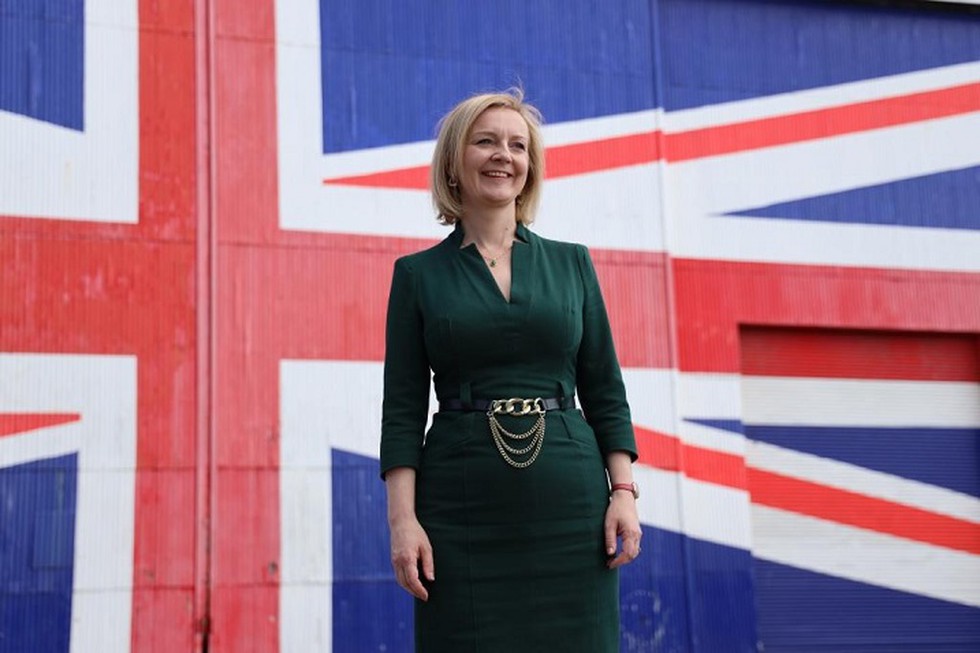
About:
- Liz defeated her rival, former Finance Minister Rishi Sunak by 81,326 votes to 60,399, after over a six-week-long grueling campaign.
- With the win, she becomes the third female Prime Minister of the United Kingdom after Theresa May and Margaret Thatcher. Truss takes over at a time when the UK is saddled with rising inflation and its worst cost-of-living crisis.
- Boris Johnson was forced to announce his resignation in July this year after months of scandal. Following the announcement, Mr Johnson will meet Queen Elizabeth to officially tender his resignation.
- A member of the Conservative Party, she has been Member of Parliament (MP) for South West Norfolk since 2010. She has served in various Cabinet positions under Prime Ministers David Cameron, Theresa May and Boris Johnson.
Source: The Hindu
10. PM-SHRI
On the occasion of Teacher's Day today, Prime Minister Narendra Modi has announced a new initiative - the development and upgradation of 14 thousand 500 schools across the country under the Pradhan Mantri Schools For Rising India (PM-SHRI) Yojana.
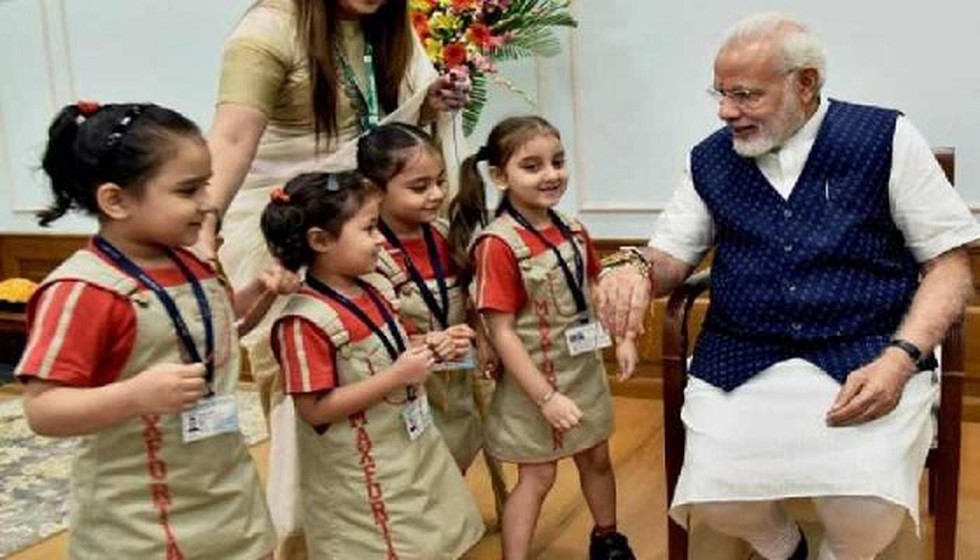
About:
- These PM-SHRI schools will become model schools which will encapsulate the full spirit of National Education Policy. The PM-SHRI schools will have a modern, transformational and holistic method of imparting education.
- The new National Education Policy was launched in 2020. The NEP replaced the 34-year-old National Policy on Education framed in 1986 and is aimed at paving the way for transformational reforms in school and higher education systems.
Source : The Hindu





























































































































































.png)
.png)
.png)
.png)
.png)


.png)
.png)
.png)





.png)
.png)






.png)
.png)
.png)
.png)
.png)
.png)
.png)
.png)
.png)

.png)







.png)
.png)


.png)
.png)
.png)


.png)

.png)
.png)





.jpg)

.png)
.png)


.png)

.png)
.png)
.png)

.jpg)

.jpg)


.png)

.png)
.png)
.png)
.png)
.png)
.png)
.png)
.png)
.png)
.png)




.png)

.png)





.png)
.png)
.png)
.png)
.png)
.png)
.png)
.png)
.png)
.png)
.jpg)
.jpg)

.png)
.png)
.png)
.png)
.png)
.png)
.png)
.png)
.png)
.png)
.png)
.png)
.png)
.png)
.png)
.png)
.png)
.png)
.png)
.png)
.png)
.png)



.png)
.png)

.jpg)
.jpg)


.jpg)
.jpg)
.jpg)
.jpg)
.jpg)

.jpg)








.jpg)
.jpg)
.jpg)
.jpg)
.jpg)

















.jpg)
.jpg)







.jpg)


















.jpg)
.jpg)



























































































.jpg)
.jpg)


























.jpg)

.jpg)










.jpg)








.jpg)




.jpg)










.jpg)


















.jpg)












































.jpg)














.jpg)
.jpg)
.jpg)





.jpg)

.jpg)
.jpg)





































































.jpg)


































.jpg)
.jpg)
















































.jpg)












.jpg)


.jpg)




.jpg)
.jpg)
.jpg)

.jpg)
.jpg)
.jpg)
.jpg)

.jpg)
.jpg)
.jpg)

.jpg)
.jpg)
.jpg)
.jpg)
.jpg)
.jpg)
.jpg)
.jpg)

.jpg)


.jpg)
.jpg)
.jpg)
.jpg)
.jpg)
.jpg)
.jpg)
.jpg)
.jpg)
.jpg)











.jpg)
.jpg)





.jpg)
.jpg)
.jpg)
























.jpg)
























.jpg)









.jpg)
.jpg)







.jpg)
.jpg)









































.jpg)
.jpg)
.jpg)
.jpg)
.jpg)

.jpg)
.jpg)
.jpg)
.jpg)
.jpg)


.jpg)
.jpg)
.jpg)
.jpg)
.jpg)

.jpg)
.jpg)
.jpg)
.jpg)
.jpg)
.jpg)
.jpg)
.jpg)
.jpg)
.jpg)
.png)

.png)
.png)

.png)
.png)
.png)
.png)


.jpg)
.jpg)

.jpg)
.jpg)
.jpg)

.png)
.png)
.png)
.png)
.png)
.png)
.png)

.png)
.png)
.png)
.png)
.png)
.png)
.png)
.png)
.png)
.png)





































































-min.png)



.png)




.png)








































